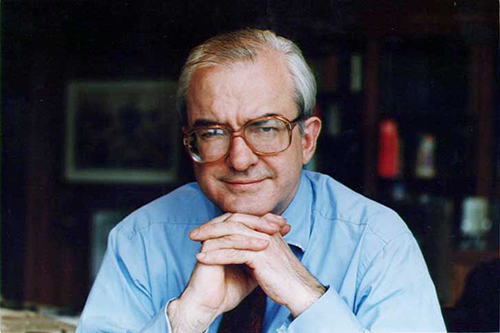
Elected President of the Saltire Society by its members on 18th June 2011
Magnus Linklater Born in 1942 and is a writer and broadcaster. Born at Harray (Orkney) , the son of author Eric Linklater (1899 - 1974). Linklater was brought up in Easter Ross and educated at Nigg, Dunbar, Eton and Cambridge, spending time in France and Germany. Making a career in journalism, he has worked for The Daily Express, Observer and Sunday Times and served as Editor of The Scotsman (1988-94). Linklater was appointed Chairman of the Scottish Arts Council (1996 - 2001).
He continues to write for newspapers and has been the author of several books, including The Falklands War (1982), Massacre - The Story of Glencoe (1982), Not With Honour - The Inside Story of the Westland Scandal (1986), For King and Conscience - John Graham of Claverhouse, Viscount Dundee (1989), Anatomy of Scotland (1992), Highland Wilderness (1993) and People in a Landscape - The New Highlanders (1997).
He holds honorary degrees from Napier University (1994) and the Universities of Aberdeen (1997) and Glasgow (2001), and is a Fellow of the Royal Society of Edinburgh.
Statement from Magnus Linklater:
I am enormously honoured to be the next President of the Saltire Society. Not only because I am a great admirer of the work that the Society does to promote the arts, literature and architecture in Scotland, but because my own family connections go back to its earliest days. My aunt Alison Macintyre -- later Sheppard -- was one of those involved in establishing the Saltire Society before the war. My father, Eric Linklater, was, too, an enthusiastic supporter of its aims. So I feel that I am carrying on a strong family tradition.
Having also been involved in Lord Cullen's Commission, examining ways forward for the Society, I believe there is a role as vital for it now as there was during the 1930s. It is, however, very different. Then, the arts and literature in Scotland confronted something of a cultural desert. Today there is no lack of activity on many fronts -- national, local, individual. But, while there may be many funded organisations supporting different aspects of the arts, there is no single, independent voice to speak up for our national culture, to focus on its strengths and to highlight, if necessary, its weaknesses. I believe there is no body in Scotland better suited for that role than the Saltire Society. I look forward to being part of its endeavours.